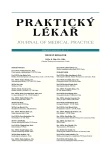Nešpor K., Mattanelli O.: Lifestyle and addictive diseases
Authors:
K. Nešpor; O. Matanelli
Authors‘ workplace:
Psychiatrická léčebna Bohnice, Praha
; Ředitel: MUDr. Martin Hollý
; Odděleni léčby závislostí – muži
Published in:
Prakt. Lék. 2011; 91(5): 293-294
Category:
Of different specialties
Overview
Addictive diseases are often associated with the lifestyle of people. Regular diet, sleep, proportionate physical activity acts as an effective protective factors. On the other hand, excessive eating and lack of fluids can induce craving for alcohol. Sleep deprivation in turn has a negative effect on cognitive and executive functions and can exacerbate addiction to nicotine. And in terms of increased risk of addictive diseases carry some sports. However considered an addictive disease as purely a matter of lifestyle would therefore not be correct.
In this paper we focus on some elements of lifestyle and their importance in the management of addictive disease
Key words:
lifestyle, addictive diseases, protective factors, risk factors.
Sources
1. Aalto, J., Kiianmaa, K. Increased voluntary alcohol drinking concurrent with REM-sleep deprivation. Alcohol. 1984, 1(1),p. 77-79.
2. Austin, E.W., Johnson, K.K. Effects of general and alcohol-specific media literacy training on children’s decision making about alcohol. J. Health Commun. 1997, 2(1), p. 17-42.
3. Hamidovic, A., de Wit, H. Sleep deprivation increases cigarette smoking. Pharmacol. Biochem. Behav. 2009, 93(3), p. 263-269.
4. Harvey, S.B., Hotopf, M., Overland, S., Mykletun, A. Physical activity and common mental disorders. Br. J. Psychiatry 2010, 197, p. 357-364.
5. Herring, M.P., O’Connor, P.J., Dishman, R.K. The effect of exercise training on anxiety symptoms among patients: a systematic review. Arch. Intern. Med. 2010, 170(4), p. 321-331.
6. Hillemacher, T., Kraus, T., Rauh, J. et al. Role of appetite-regulating peptides in alcohol craving: an analysis in respect to subtypes and different consumption patterns in alcoholism. Alcohol Clin. Exp. Res. 2007, 31(6), p. 950-954.
7. Kupersmidt, J.B., Scull, T.M., Austin, E.W. Media literacy education for elementary school substance use prevention: study of media detective. Pediatrics. 2010, 126(3), p. 525-531.
8. Larimer, M.E., Palmer, R.S., Marlatt, G.A. Relapse prevention. An overview of Marlatt’s cognitive-behavioral model. Alcohol Res Health. 1999, 23(2), p. 151-160.
9. Manzoni, G.M., Pagnini, F., Castelnuovo, G., Molinari, E. Relaxation training for anxiety: a ten-years systematic review with meta-analysis. BMC Psychiatry. 2008, 8, p. 41.
10. Matuskey, D., Pittman, B., Forselius, E. et al. A multistudy analysis of the effects of early cocaine abstinence on sleep. Drug Alcohol Depend. 2010 Dec 6. (Epub ahead of print).
11. Nešpor, K. Dietetická doporučení pro závislé na alkoholu, Praha, 2010. Dostupné na www.drnespor.eu/a-jidlo3.doc.
12. Nešpor, K. Pohybová cvičení a jóga v prevenci a léčbě závislostí. Česká a slovenská psychiatrie. 2005, 101(5), s. 268-270. Dostupné na www.drnespor.eu.
13. Nešpor. K. Zůstat střízlivý. Brno: Host 2006. 238 s.
14. Nešpor, K.: Uvolněně a s přehledem. Relaxace a meditace pro moderního člověka. Praha: Grada 1998. 96. s.
Labels
General practitioner for children and adolescents General practitioner for adultsArticle was published in
General Practitioner

2011 Issue 5
- Advances in the Treatment of Myasthenia Gravis on the Horizon
- Hope Awakens with Early Diagnosis of Parkinson's Disease Based on Skin Odor
- Memantine in Dementia Therapy – Current Findings and Possible Future Applications
- Memantine Eases Daily Life for Patients and Caregivers
- Possibilities of Using Metamizole in the Treatment of Acute Primary Headaches
-
All articles in this issue
-
Základy kognitivní, afektivní a sociální neurovědy
V. Láska -
Biologická léčba v onkologii (II)
Monoklonální protilátky, cytokiny - Fenclová Z., Urban P., Pelclová D., Havlová D., Čerstvá M.: Occupational diseases reported in the Czech Republic in 2010
- Jarošová D., Janíková E., Vrublová Y., Zeleníková, R., Tomášková H., Papastavrou E.: Patient satisfaction with nursing care in surgical departments
- Pohlová L., Kozáková R., Jarošová D.: Burn-out among nurses working in geriatric departments
-
Klodronát … aneb stará láska nerezaví
Využití u karcinomu prsu a karcinomu prostaty - Matějek J.: Spirituality of the patient in connection with the interpretation of advance directives
- Kučera I., Hlaváč P.: Evaluation of risk factors in the working environment and occupational diseases
- Nešpor K., Mattanelli O.: Lifestyle and addictive diseases
- Chlumský J.: Differential diagnosis of elevated serum troponin in the department of Internal Medicine
-
Základy kognitivní, afektivní a sociální neurovědy
- General Practitioner
- Journal archive
- Current issue
- About the journal
Most read in this issue
- Chlumský J.: Differential diagnosis of elevated serum troponin in the department of Internal Medicine
- Pohlová L., Kozáková R., Jarošová D.: Burn-out among nurses working in geriatric departments
-
Biologická léčba v onkologii (II)
Monoklonální protilátky, cytokiny - Kučera I., Hlaváč P.: Evaluation of risk factors in the working environment and occupational diseases
